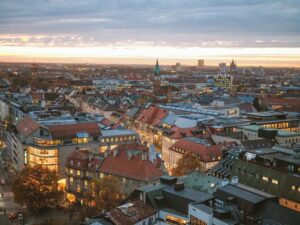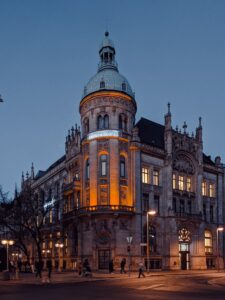While trying to learn German quickly and efficiently, a great way to go about it is to immerse yourself in the language by living in a German-speaking country.
If you want to move to Germany, you might get caught up in the decision of which city to move to.
Here is a list of 5 cities that are great destinations for German learners, no matter if you’re a beginner or an advanced learner.
When looking for an answer to what’s the best city to learn German from.
Keep in mind that this list is subjective, and some of the most popular cities might not appeal to you!
Focus on what you want and need in a city in order to be happy and then go from there!
1. Berlin, Germany
This multicultural city is a student’s dream.
After the fall of the Berlin Wall in 1989, the city has been blooming into a hotspot of activities and culture.
The Art scene of Berlin is one of the trendiest in all of Europe, and especially young people seem to love this city a lot.
Home to numerous universities, students swarm to Germany’s capital each year to attend school. So if you are planning to study in Germany, this city is a great tip!
Another one of Berlin’s strong points is its diversity. Did you know that almost 1 out of 7 people living in Berlin is originally from another country?
With Berlin’s size, that’s almost half a million people with foreign origins in one city!
When you take the people with a migration background (at least one parent from another country) into consideration, it’s almost 1/3 of the population!
This will yield many benefits for you! Not only is there an abundance of German courses to choose from, but most people will also be very understanding if you don’t know the language well, yet.
On top of that, when you find yourself in an emergency and unable to express yourself in German, English will get you a long way.
Another advantage is that in case you ever get homesick, there is a good chance that there is a community or at least a bunch of people from your home country to connect with!
2. Munich, Germany
Munich is probably what most people picture when they think about Germany.
The great thing about Munich is that you get a lot of the advantages Berlin has to offer while being in a bit of a more traditional German city.
Munich is also home to multiple great schools, including the Goethe Institut and Berlitz.
The number one university in all of Germany, Technische Universität München (TUM) is also located there.
Although traditional, Munich is still a modern, cosmopolitan, and exciting city. But from the looks of it, it is like a physical manifestation of every German stereotype ever.
Are you looking for a place where lederhosen and dirndl are worn seriously?
Beautiful churches with the Alps in the background? Sausages and Sauerkraut? Tons of great beer?
Then Munich is your place to be. Nowhere else in Germany will you get this truly authentic German feeling.
When you are new to learning German, the one drawback of this city might be the Bavarian dialect, which can be a bit tricky to understand at first. On the other hand, if you are up for the challenge, you will quickly adapt.
3. Heidelberg, Germany
Heidelberg has a long history of education. The Heidelberg University, also known as Ruprecht Karl University, is the oldest university in Germany, having been founded in 1386!
The city is small but beautiful, home to Heidelberg Palace, an attraction that draws many tourists to the city every year.
The size might be an advantage if you are not into huge, cosmopolitan cities like Berin and Munich.
There are still plenty of options for language schools, and there are many students that live in the city.
Another plus point of this small, but beautiful city, is that it is only a short train ride away from Stuttgart, Frankfurt, Cologne, and even France and Belgium!
4. Hannover, Germany
This city is overlooked more often than not. Most people outside of Germany have never heard of it, let alone plan on visiting. Hannover is a great city to live in, though!
A huge advantage for German learners in Hannover is that the city is known for having das reinste Deutsch (the purest German).
What that means, is that the German dialect spoken in Hannover is the closest you will get to standard German.
This will be a great pronunciation practice, and will make understanding others a lot easier!
Hannover ranks pretty much in the middle when it comes to size and population throughout Germany.
This gives it a great balance between city flair and having enough space and calm to relax.
5. Vienna, Austria
Austrian cities are often overlooked when people think of German-speaking cities.
Vienna is the capital of Austria and offers a beautiful, sophisticated, cosmopolitan flair that will enchant you upon arrival.
It is also home to numerous great universities and language schools.
Austria can be compared to Munich in its dialect. It can be tricky to understand Austrians at first, but generally, everyone can speak standard German.
Vienna is also your best bet when it comes to understanding a lot of German, as it is the city with the closest dialect to standard German in Austria.
In Vienna, you will not only have a great student scene with tons of restaurants and bars, but you also have access to some amazing museums and galleries.
Choose what feels right for you
As you can see, there are many cities to choose from when trying to move to a German-speaking place. These are only the top 5, but there are many more that may be a good choice for you!
The most important thing to ask yourself is, what kind of city would you be happiest in? Which city offers most of what you are passionate about? Do you love buzzing, huge cities or do they stress you out? Do you want a focus on culture or on scenery?
All these questions are very individual, and nobody can answer them but you. Whatever your choice will be, any of these cities will help you immensely when learning German!






